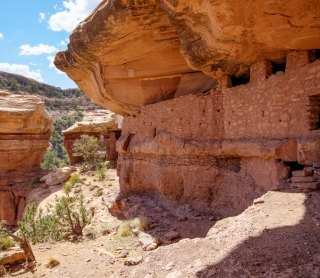
A trusted partner of Indigenous, Alaskan, and Hawaiian governments and organizations for more than 40 years.
SWCA’s assist clients in the public and private spheres with all aspects of Indigenous community relations and consultation. We support efforts and initiatives that meets organizational and agency goals while upholding the values of the indigenous community, traditions, and culture.
We center engagement and relationship building with Indigenous communities and governments in our practice and processional services. We work with clients, governments, and communities to address the essential needs of environment, heritage, and human industry
We offer services from the highest level of federal policy implementation to robust ethnographic investigations to inform project design and permitting. We understand that cultural perspectives shape preferred policies and inform the actions of Indigenous governments and their constituencies. We offer Indigenous community-relations services and liaisons, both for facilitating government-to-government consultation and for engaging Indigenous governments and communities with private sector clients. We also support Indigenous governments and community members in fieldwork, such as on-the-ground identification of traditional cultural places.
Relevant Services
- Consultation and Regulatory Process Support
- Tribal Field Survey and Monitoring Support and Training
- Traditional Cultural Place (TCP) Documentation and Evaluation with Tribes
- National Register of Historic Places and TCP Preservation Plan Development
- Ethnography, Ethnology, and Ethnohistory
- Cultural and Biological Assessments and Traditional Ecological Knowledge Consultation
- Natural Resource and Restoration Management Assistance
- Environmental Assessments and NEPA Support
- Environmental Justice
- Energy Sovereignty Support / Community Solar
- Tribal Historic Preservation Office Heritage Preservation Plan Development
- Grant-Writing Assistance and Funding Source Identification
- Preparation Assistance for Community Wildfire and Hazard Mitigation Plans
Project Spotlights
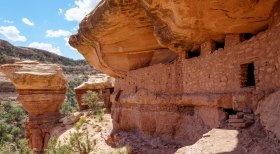
SWCA News
SWCA to Assist with Management Plan for Bears Ears National Monument
SWCA to assist BLM, US Forest Service, and the five Tribes of the Bears Ears Commission with preparing a Resource Management Plan and Environmental Impact Statement for the Bears Ears National Monument
On October 8, 2021, an executive order (Proclamation 10285), restored and retained the 1.36 million acres boundaries of the Bears Ears National Monument in San Juan County, Utah, and recognized the importance of Tribal Nations’ knowledge and partnership in its management.
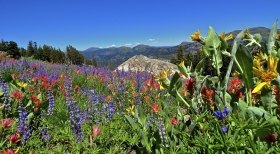
The Wire
A Plant By Any Other Name
Although the 2004 Power Fire in Northern California’s Eldorado National Forest occurred nearly two decades ago, recent grant funding from the National Fish and Wildlife Foundation provided an opportunity to restore the area’s ecology and strengthen partnerships between Native American communities and the U.S. Forest Service.
Spurred by long-standing consultation between local Native American Tribes and the Eldorado National Forest, in late 2019 the nonprofit organization American Conservation Experience selected SWCA as the environmental agency to partner with local Native American Tribes and the Forest Service on a conservation project using this funding.

SWCA Gives Back
SWCA Gives Back Campaign Supports Native American Food Security
SWCA launched a companywide Gives Back Campaign called Funds for Food to support organizations fighting for food security throughout the United States. AmpleHarvest.org, the recipient of SWCA’s matching grant, recently reached out to share the nationwide rollout of AmpleHarvest.org in Indian Country – a new program specifically built to overcome some of the informational and logistical difficulties other hunger/food waste programs confront in many Tribal communities.
Gary Oppenheimer, Ample Harvest.org Founder and Executive Director, comments on SWCA’s support in relation to this program:
“The incredibly generous donation from SWCA will greatly accelerate the rate of growth of the program in Native American Reservations nationwide and will be hugely impactful this year and for years to come in reducing both food waste and hunger/malnutrition in these communities.”
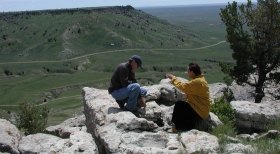
The Wire
A New Chorus: How the rise in tribal voices benefits people and projects
Contrary to what some may think – early engagement with tribal governments doesn’t weigh projects down with extra steps. Instead, it leads to a better path for the resolution of concerns, more efficient approvals, and fewer surprises once the project is underway. Tribal governments have always maintained their interest in the lands and resources important to the people they represent, their lives, spirits, and identity.
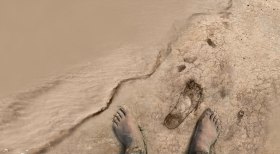
The Wire
Following Their Footsteps: Routine Archaeological Investigations Reveal Glimpses of Ancient Lifeways
One summer, nearly 3,000 years ago, monsoon rains caused Rillito Creek in Tucson, Ariz., to overflow its banks and swamp a family’s fields at the confluence of the creek and the Santa Cruz River. As the water receded, a layer of sand was deposited, burying the footprints left by nine adults, two children, and a dog.
For native tribes in the area, the footprints were a missing piece to a puzzle that had been handed down by elders for generations. When members of the Tohono O’odham Nation visited the exposed trackways, several commented that this was the missing proof of all that they had been told – that their people have lived and farmed this basin for thousands of years.


